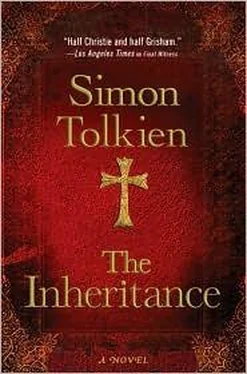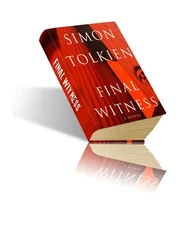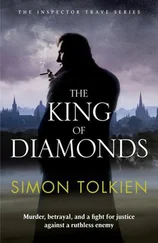Simon Tolkien - The Inheritance
Здесь есть возможность читать онлайн «Simon Tolkien - The Inheritance» — ознакомительный отрывок электронной книги совершенно бесплатно, а после прочтения отрывка купить полную версию. В некоторых случаях можно слушать аудио, скачать через торрент в формате fb2 и присутствует краткое содержание. Жанр: Полицейский детектив, на английском языке. Описание произведения, (предисловие) а так же отзывы посетителей доступны на портале библиотеки ЛибКат.
- Название:The Inheritance
- Автор:
- Жанр:
- Год:неизвестен
- ISBN:нет данных
- Рейтинг книги:4 / 5. Голосов: 1
-
Избранное:Добавить в избранное
- Отзывы:
-
Ваша оценка:
- 80
- 1
- 2
- 3
- 4
- 5
The Inheritance: краткое содержание, описание и аннотация
Предлагаем к чтению аннотацию, описание, краткое содержание или предисловие (зависит от того, что написал сам автор книги «The Inheritance»). Если вы не нашли необходимую информацию о книге — напишите в комментариях, мы постараемся отыскать её.
The Inheritance — читать онлайн ознакомительный отрывок
Ниже представлен текст книги, разбитый по страницам. Система сохранения места последней прочитанной страницы, позволяет с удобством читать онлайн бесплатно книгу «The Inheritance», без необходимости каждый раз заново искать на чём Вы остановились. Поставьте закладку, и сможете в любой момент перейти на страницу, на которой закончили чтение.
Интервал:
Закладка:
“Why don’t you? There’s still time,” said Clayton, feeling slightly surprised by the inspector’s obvious antipathy toward the prosecutor. He’d not been aware of it before now.
“No, it won’t work,” said Trave hurriedly. He felt surprised at himself for having said so much. It was what came from keeping so much bottled up inside. He liked Adam Clayton, but he knew he shouldn’t be talking to him like this. Clayton was too junior, and besides he hadn’t yet given his evidence.
“Why won’t it work?” asked Clayton. The inspector’s anxieties about the case had begun to trouble him too.
“Because there’s no time. The prosecution case’ll be over by tomorrow or the next day. And then it’ll be up to the other side. I’m sure they’ll have made their own enquiries. The defendant’s barrister doesn’t look like he’s anyone’s fool. And we’re not here to do his job for him. He won’t thank us for getting in his way,” Trave added as he got up to go. He gave the impression of having talked himself out of his earlier uncertainty, and he avoided any further reference to the court case on their way back to the Old Bailey.
They parted company in the main hall.
“Don’t wear your shoes out walking up and down, Adam,” said Trave smiling. “Everything’ll be fine. I promise you.”
“Where are you going to be?” asked Clayton, feeling suddenly nervous again.
“In court. I want to hear what Mrs. Ritter has to say. And if you’re still here at the end of the day, I’ll drive you back to Oxford.”
It was almost two o’clock, and most of the main actors in Stephen Cade’s drama were already in their places. The public gallery was packed full of spectators just like it had been in the morning, and Trave noticed Ritter and Silas sitting in opposite corners. There was no way of knowing if they were conscious of each other’s presence, but Silas certainly looked ill at ease. He kept fidgeting with his tie, running his hand through his thin sandy-coloured hair. The sergeant, on the other hand, looked more than satisfied with the world around him, and several times Trave saw him rubbing his pudgy hands together.
Suddenly the whispering and fidgeting stopped, and everyone got to their feet as Judge Murdoch swept into court. He looked even more foul tempered than usual, thought Trave. Rumour had it that the judge’s digestive system was shot to pieces after years of overindulgent lunches. Certainly the afternoon was not the best time to get on the wrong side of him.
“All right. Who’s next?” the judge growled at Thompson, once he was ready.
“Jeanne Ritter,” said the prosecutor, clearly unperturbed by the judge’s irritation. Most of the time Thompson actually felt stimulated by Murdoch’s permanent bad temper. He thought of it as a sort of righteous rage against all criminals, and Murdoch was clever as well as angry. He’d already made some well-timed interventions that friend Swift hadn’t had an answer to.
After a few moments the door at the back of the court swung open and Jeanne Ritter followed the usher up the aisle to the witness box. She took the oath in a quiet voice that Trave, sitting at the back of the court, could hardly hear, and then the judge made her do it all over again.
“Louder this time, young woman,” he said. “This isn’t a boudoir, it’s a court of law.”
Ritter’s wife was obviously nervous, but there was also a determination about the way that she vowed to tell the truth that made Trave prick up his ears. It wasn’t how he remembered her, back on the day after the murder, when he went out to Moreton Manor to take her statement. She’d been nervous and quiet then too, but most of all apologetic that she couldn’t help the police because she’d seen nothing at all. Trave remembered how anxiously insistent she’d been about that. He’d wondered about it at the time, but then he’d put it down to her being a foreigner and highly strung. Anyone married to Sergeant Ritter would’ve had reason enough to suffer from anxiety.
She’d been crying. That much was obvious. Her eyes were swollen, and there were red blotches on her cheeks left by the little white handkerchief that she now had entwined in her fingers. She wore her long auburn hair tied up behind her, and the black dress with long sleeves and high collar gave the impression that she was here for someone’s funeral. She looked haggard and awful but pretty too, and her husky French voice stumbling over unfamiliar English words made Trave understand why Ritter had always seemed so pleased with his possession of her.
“Please tell the court your full name,” asked Thompson.
“It is Jeanne. Jeanne Ritter.”
“And you are married to Mr. Reginald Ritter, from whom we have already heard?”
“Yes.” Jeanne’s voice sounded sad, as if her marriage was a source of lasting regret, and Trave noticed Ritter stir impatiently in his seat in the public gallery.
“How long have you been living at Moreton Manor House, Mrs. Ritter?”
Jeanne closed her eyes, and Trave wondered for a moment if something was wrong. But as it turned out, she was just thinking, calculating time.
“Seven years. Perhaps eight,” she said. “We came after the lady died. She didn’t want to know Reg. Not like the professor did.”
“I see. And after you came, what did you do at the manor house?”
“I was the housekeeper. I looked after the house, and Reg, he looked after the professor.”
“So did you have keys to the various doors?” Thompson asked, looking interested in his witness for the first time since she started giving evidence.
“Yes, of course. The professor had one set, and I and my husband, we had another.”
“What about the internal door to the professor’s study? Did you have a key to that?”
“I am sorry. I do not understand. Which door do you mean?”
“The one inside. The one leading out into the corridor.”
“Yes, I had the key to that one too. But I never used it.”
“Why not?”
“Because the professor, he never locked that door. Only the one that goes outside. Sometimes he locked that one.”
“Thank you, Mrs. Ritter,” said Thompson, looking pleased. “Now I want to ask you, please, about what happened on the night that Professor Cade was murdered.”
“Yes, that is what I want to tell you about. About what I saw,” said Jeanne, suddenly gripping hold of the edge of the witness box with both her hands. She looked frightened and determined all at the same time, reminding Trave of a suicide that he’d failed to talk down from the top of the University Church two years earlier. The face had stayed with him, imprinted on his mind.
“What did you see?” asked Thompson, sounding puzzled. There was nothing in the woman’s statement about seeing anything special. In fact, she seemed to have been pretty insistent that she saw nothing at all. She’d told the police that several times.
“I saw Silas Cade in the courtyard. It was before the shouting started. And he was going from the study to the front door. I saw him go inside.”
“Where were you?”
“I was at my window, doing my hair. I had not gone to bed. My husband had. He was waiting for me.”
“But he told us you both went to sleep,” interrupted Thompson, countering with the first thing that came into his head. He’d left his prepared questions behind, and now he was in uncharted territory.
“He may have been asleep. I don’t know. It doesn’t matter. It’s what I saw outside that is important,” said Jeanne. It was as if it hadn’t occurred to her that she wouldn’t be believed. “I could see everything because there was a moon. How do you call it when the moon is big?” she asked.
“A full moon,” said Thompson.
Читать дальшеИнтервал:
Закладка:
Похожие книги на «The Inheritance»
Представляем Вашему вниманию похожие книги на «The Inheritance» списком для выбора. Мы отобрали схожую по названию и смыслу литературу в надежде предоставить читателям больше вариантов отыскать новые, интересные, ещё непрочитанные произведения.
Обсуждение, отзывы о книге «The Inheritance» и просто собственные мнения читателей. Оставьте ваши комментарии, напишите, что Вы думаете о произведении, его смысле или главных героях. Укажите что конкретно понравилось, а что нет, и почему Вы так считаете.












